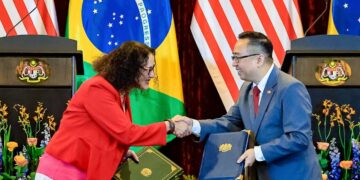
The Minister of Science, Technology and Innovation, Luciana Santosconfirmed that a joint venture between the Brazilian company Tellescom and a Malaysian partner for the production of semiconductors. The information was disclosed in an interview with Brazil in factduring the visit of the president’s delegation Luiz Inácio Lula da Silva (PT) a Kuala Lumpurin Malaysia.
According to the minister, the initiative aims to resume national chip production capacity and insert Brazil more actively in a strategic global chainessential for the technology and energy industry.
“The partnership with Malaysia should strengthen the recovery of the national semiconductor industry and pave the way for Brazil to participate more actively in this global chain”, stated Luciana Santos.
Technological partnership and focus on the energy transition
A joint venturea cooperation model that involves sharing of investments, technologies and resultsshould focus on manufacturing chips intended for electric vehicles, hybrids and energy transition equipment.
The new technological route is part of the Brazilian government’s strategy to reindustrialization and digital sovereigntyhaving as its axis the reactivation of the National Center for Advanced Electronic Technology (Ceitec) — state-owned company that had been privatized during the previous administration and resumed operations focusing on innovation and semiconductors.
According to sources from the Ministry of Science, Technology and Innovation (MCTI), the partnership with Malaysian companies was chosen because of the Asian country’s experience in the microelectronics sectorconsolidated over four decades as a global hub for chip assembly and encapsulation.
Bilateral agreements and scientific cooperation
During the official visit to Malaysia, Brazil and Malaysia signed five cooperation agreements in the areas of science, technology and innovationcovering topics such as semiconductors, digital transformation, bioeconomy and space cooperation.
The agreements provide knowledge transfer, technical exchange and joint projects research at universities and technological development centers. The Brazilian government assesses that rapprochement with the Asian country could open up new investment opportunities in the green technologies e highly complex industry.
In a note, MCTI informed that the cooperation plan will be articulated with the New Industry Brazil Programlaunched in January, which provides R$300 billion in credit and financing until 2028 to strengthen the national production of technological goods and advance the decarbonization of the economy.
Ceitec and technological sovereignty
Minister Luciana Santos highlighted that the resumption of Ceitecbased in Porto Alegre (RS), is one of the pillars of the government’s innovation policy. The center will be responsible for developing and testing new integrated circuits focusing on electric mobility, logistics tracking and digital security.
“We are rebuilding a technological base that was destructured and which is essential for the country’s sovereignty. Without semiconductors, there is no modern industry, nor energy autonomy”, stated Luciana.
Ceitec should work in synergy with the Brazilian Industrial Research and Innovation Company (Embrapii) and with the National Bank for Economic and Social Development (BNDES)which will finance part of the investments in the sector.
Rare earths and mineral policy
In addition to semiconductors, the minister highlighted the Brazilian potential in the production of rare earthsgroup of 17 chemical elements essential for the manufacture of electric motors, batteries and high-tech equipment.
Brazil has the second largest reserve in the world of these substances, second only to China, and plans to exploit the resource based on scientific and environmental criteria.
To coordinate the policy for using these minerals, the government created the National Mineral Policy Council (CNPM)a body directly linked to the Presidency of the Republic. The board will be responsible for define exploration rules, research authorizations and value-adding policiesavoiding the gross export of resources.
“The CNPM was created to ensure that this natural heritage is explored with a focus on scientific and sustainable development, without repeating models of dependence and privatization of reserves”, explained Luciana Santos.
Global strategy and industrial integration
The partnership with Malaysia is also part of a broader agenda of Brazil’s productive reintegration to global technology chains, especially in the context of BRICS expandedwhich includes emerging economies in Asia, Africa and the Middle East.
Malaysia is today one of the main producers of electronic components in Southeast Asia and has companies specializing in chip design and encapsulation, segments considered essential for the expansion of industry 4.0.
Diplomatic sources indicate that the joint venture project could count on joint financing of development banks e Asian sovereign wealth fundsin addition to support from the New Development Bank (NBD)a BRICS institution based in Shanghai.
Value chain and competitiveness
According to data from the Brazilian Association of the Electrical and Electronic Industry (Abinee), Brazil imports 98% of the semiconductors it consumeswhich makes the sector highly dependent on foreign suppliers. Local production would reduce costs and increase the competitiveness of the national industry in strategic segments, such as automotive, telecommunications, energy and defense.
The Brazil–Malaysia joint venture, therefore, is seen as an initial step towards the reconstruction of the national microelectronics production chaina sector considered central to the economic and technological development of the coming decades.
“The resumption of Ceitec and cooperation with Malaysia are part of a long-term vision to consolidate Brazil as a technology producer, not just a consumer”, concluded Luciana Santos.
Source: https://www.ocafezinho.com/2025/10/28/brasil-e-malasia-negociam-joint-venture-para-producao-de-semicondutores-e-avancam-em-acordos-de-tecnologia/

